Find Help
More Items From Ergsy search
-
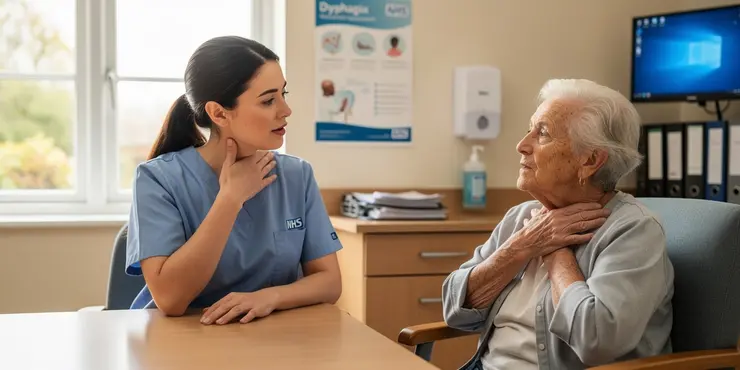
Swallowing awareness - dysphagia
Relevance: 100%
-
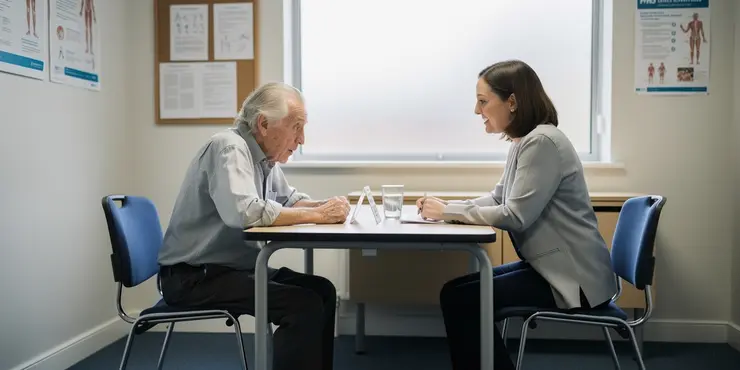
How does motor neurone disease impact swallowing?
Relevance: 40%
-
Problems swallowing pills: Lean forward technique | NHS
Relevance: 36%
-

Problems swallowing pills: Pop bottle technique | NHS
Relevance: 36%
-

Mouth Cancer Awareness
Relevance: 25%
-
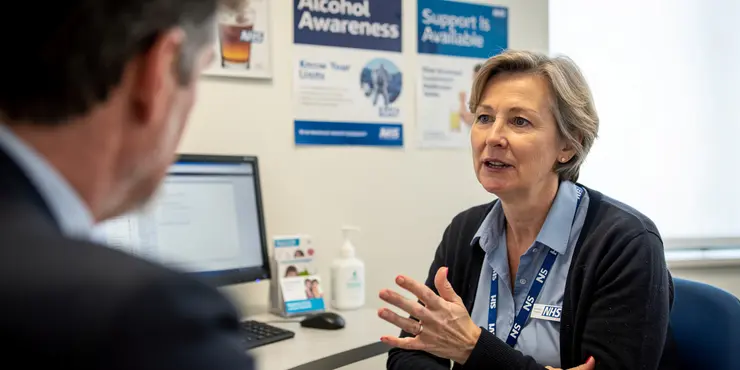
Alcohol Awarerness Week
Relevance: 24%
-
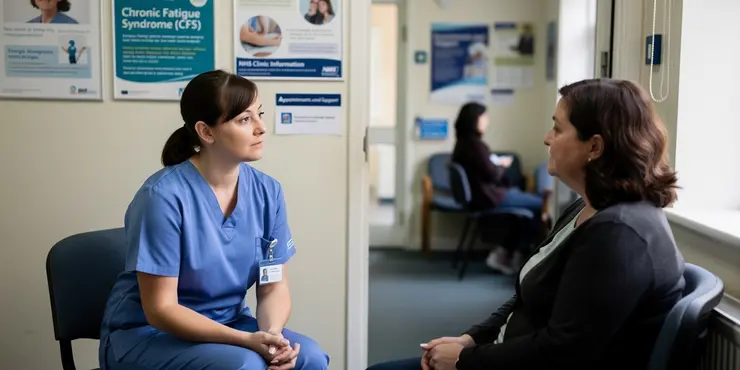
Why is it important to increase awareness about CFS?
Relevance: 20%
-
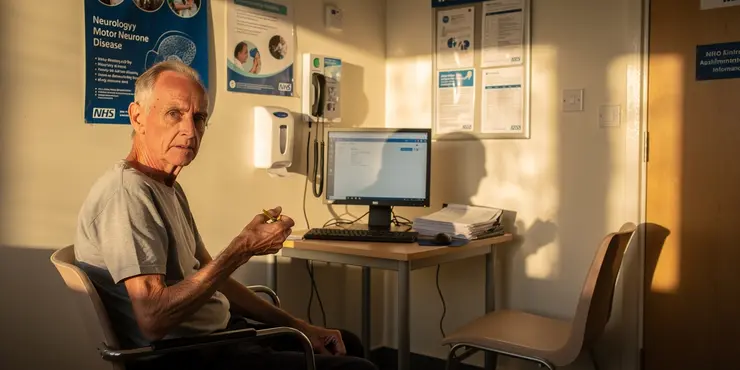
How does motor neurone disease affect the body?
Relevance: 19%
-
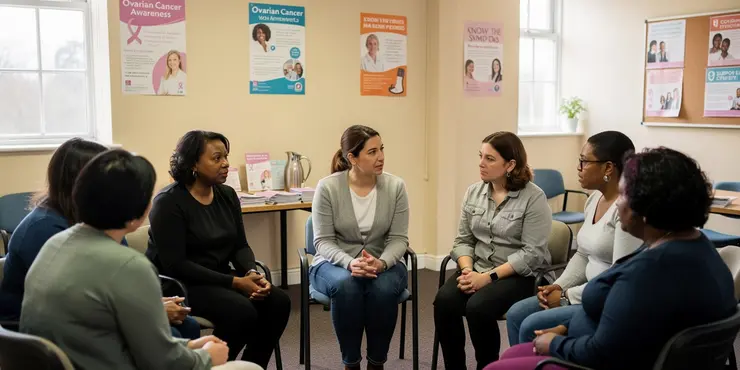
Raising awareness of ovarian cancer
Relevance: 18%
-
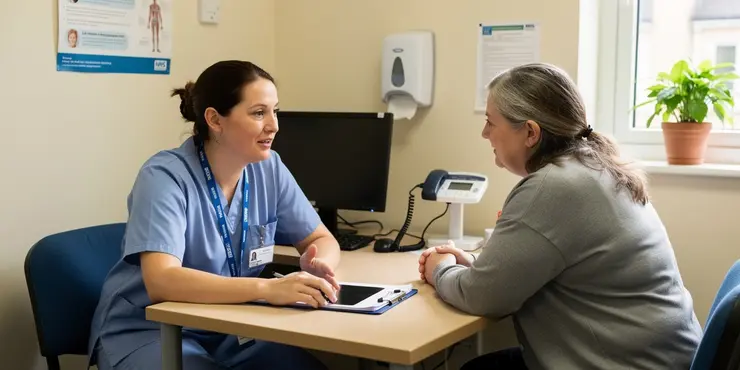
Scams of 2024/2025 ? (Be Aware)
Relevance: 18%
-
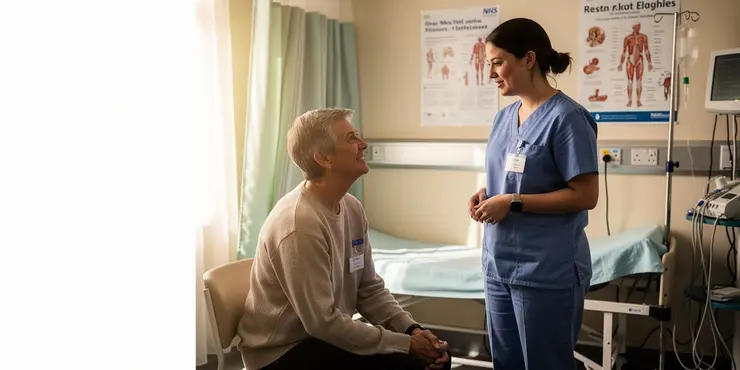
What are the primary symptoms of motor neurone disease?
Relevance: 18%
-
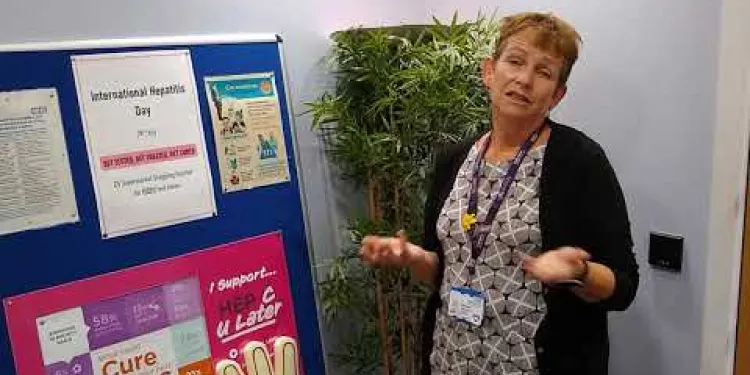
Sue Doherty on hepatitis C awareness
Relevance: 17%
-

Joan's story - Aphasia Awareness
Relevance: 17%
-
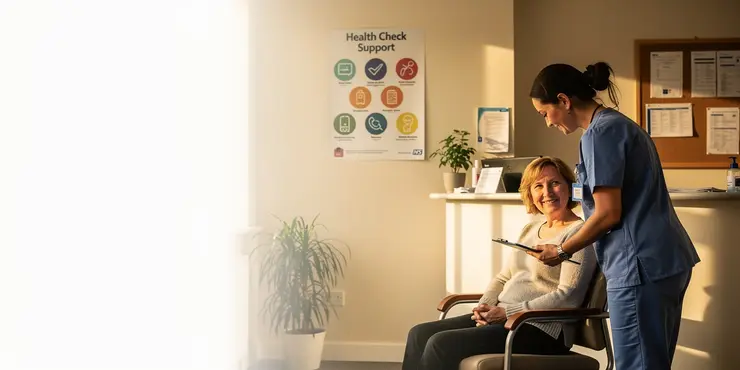
What healthcare policies should support workers be aware of?
Relevance: 17%
-

Are there any hidden fees I should be aware of?
Relevance: 16%
-
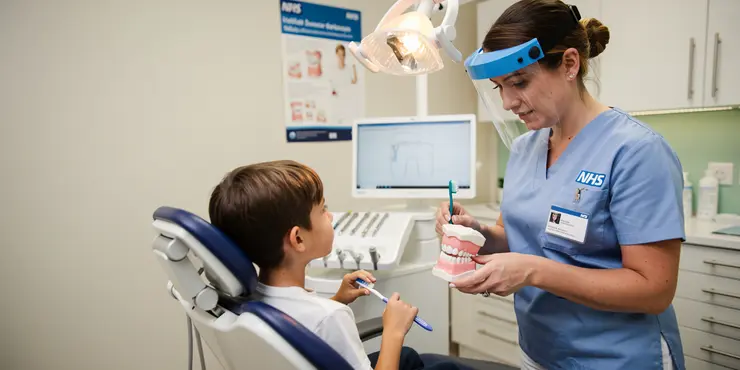
Oral Health Awareness - Tooth Decay
Relevance: 16%
-

What is motor neurone disease?
Relevance: 15%
-
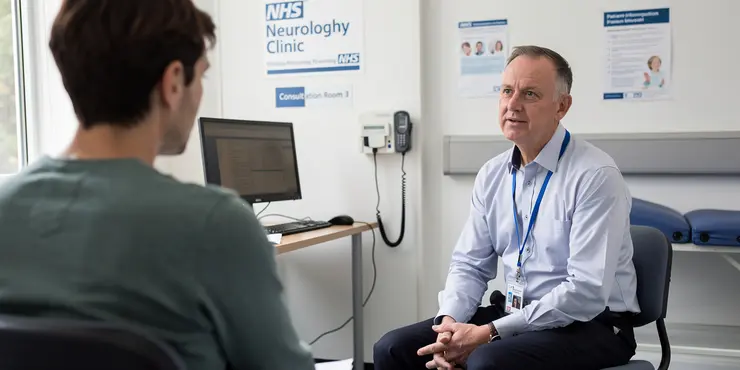
What kinds of specialists are involved in treating Huntington's disease?
Relevance: 14%
-
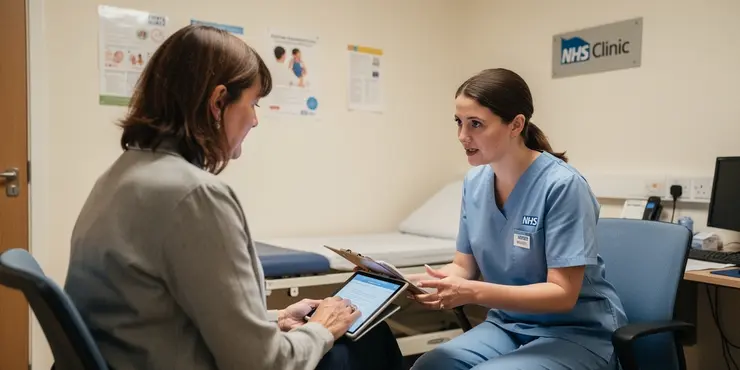
Is the government conducting any awareness campaigns about fake adverts?
Relevance: 14%
-

What are policy exclusions I should be aware of when buying holiday insurance?
Relevance: 13%
-
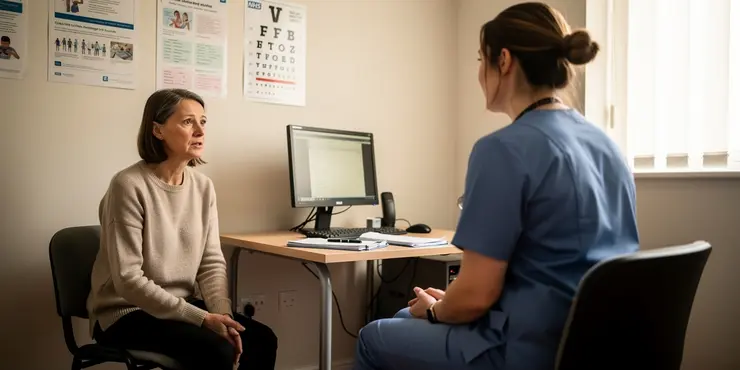
What are the symptoms of Huntington's disease?
Relevance: 13%
-
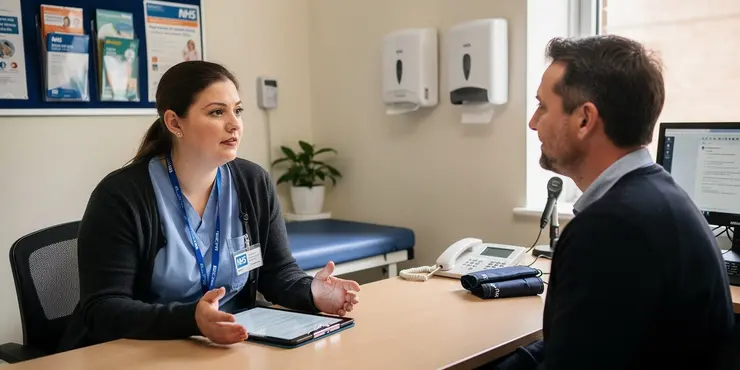
Are there any customs regulations to be aware of when entering France or Spain?
Relevance: 13%
-
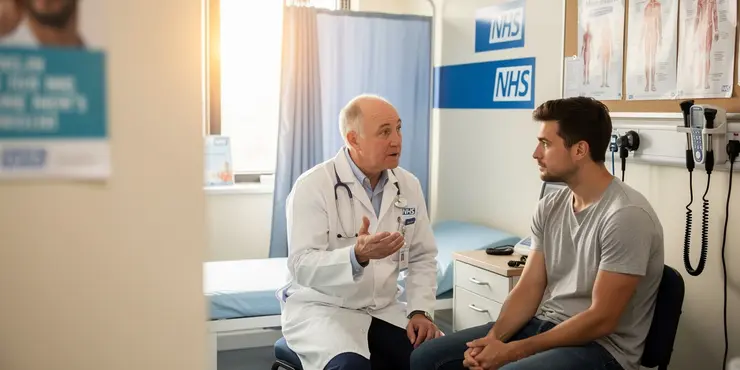
Getting to know your Testicles: Testicular Cancer Awareness with Dr James Howarth, Spilsby Surgery
Relevance: 12%
-
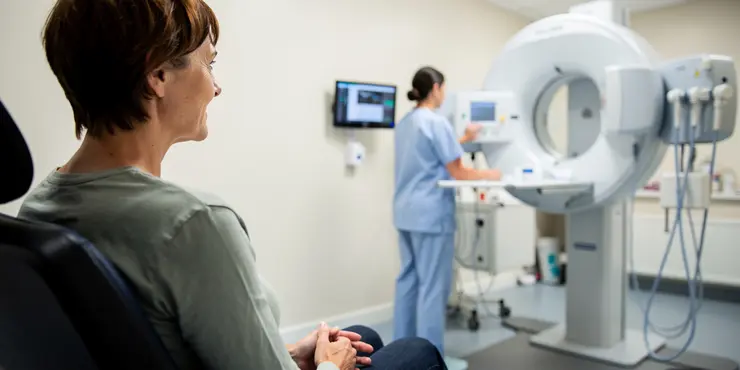
Radiotherapy to the Head and Neck: A Guide for patients and their carers
Relevance: 11%
-
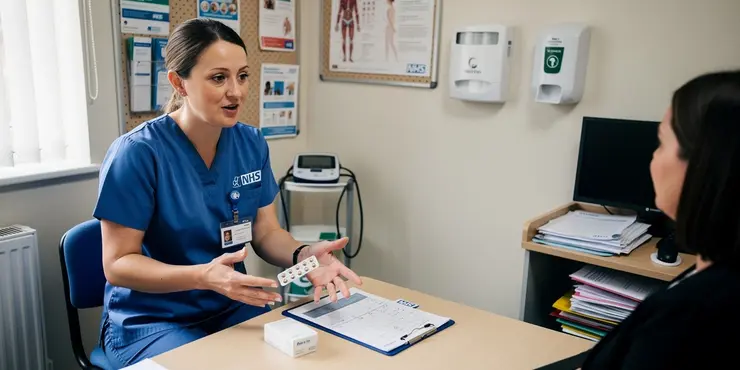
How should Wegovy tablets be taken?
Relevance: 10%
-

Is there a risk of thyroid tumors with Ozempic?
Relevance: 10%
-
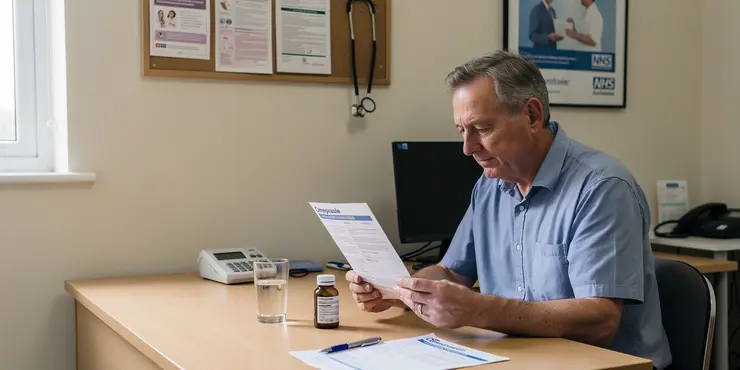
How should I take Omeprazole?
Relevance: 9%
-

Can Botox cause serious health issues?
Relevance: 9%
-
Are there different types of motor neurone disease?
Relevance: 9%
-

Help with tonsillitis
Relevance: 8%
-

How to treat tonsillitis | NHS
Relevance: 8%
-

What treatments are available for motor neurone disease?
Relevance: 8%
-
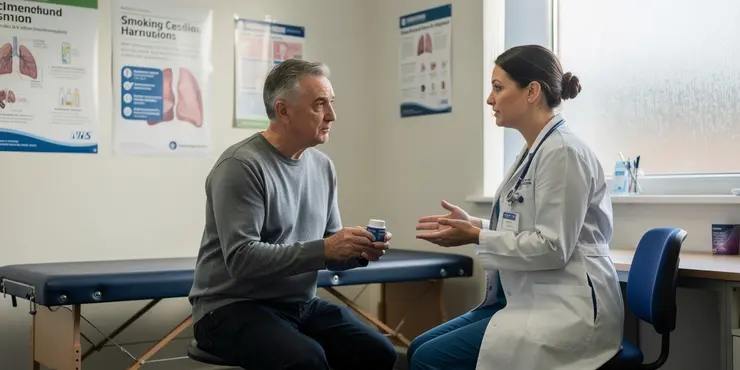
What are nicotine pouches?
Relevance: 8%
-
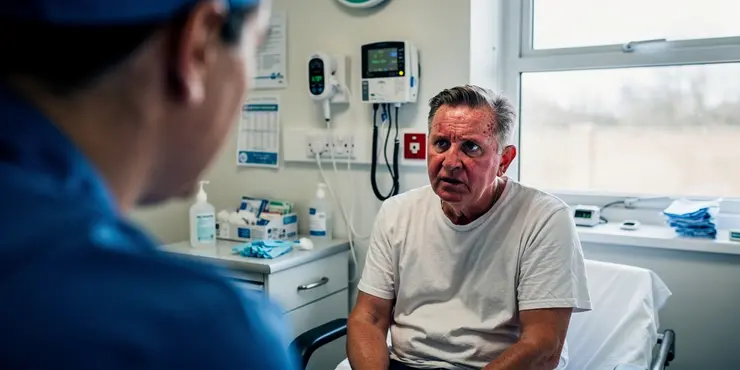
What should I do if someone is suffering from heatstroke?
Relevance: 8%
-
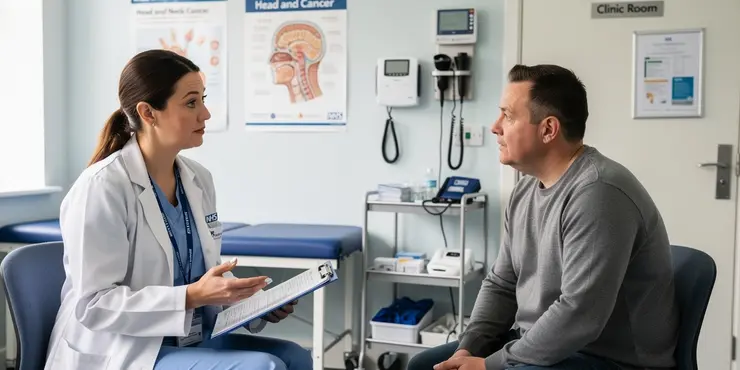
Head and Neck Cancer Diagnosis
Relevance: 8%
-
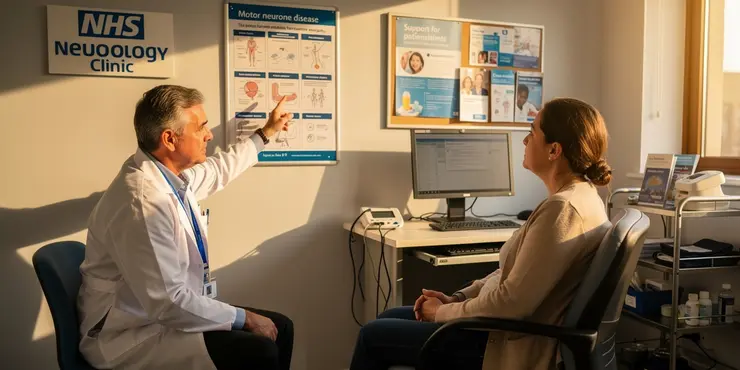
Is there a cure for motor neurone disease?
Relevance: 8%
-

Mouth Cancer Infomercial
Relevance: 7%
-
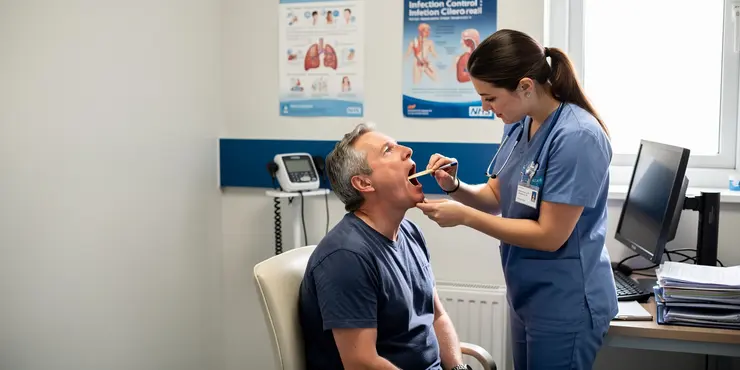
Treating a sore throat
Relevance: 7%
-

Sore throat: what should I do?
Relevance: 7%
-

What should I do if I experience side effects after a Botox injection?
Relevance: 7%
Swallowing Awareness - Dysphagia
Understanding Dysphagia
Dysphagia, commonly known as difficulty swallowing, is a condition that affects many individuals across the United Kingdom. It can occur at any stage of life, but it is more prevalent among older adults and people with certain medical conditions. Dysphagia can be caused by problems in the mouth, throat, or esophagus, and ranges from mild discomfort to severe difficulty swallowing liquids and solids.
Causes of Dysphagia
Dysphagia often arises from a wide array of health issues. These may include neurological disorders such as stroke, Parkinson’s disease, or multiple sclerosis, which can impair muscle control and coordination. Other causes include obstructions like tumors or strictures, gastroesophageal reflux disease (GERD), and age-related changes leading to weakened muscles in the swallowing process. Accurate diagnosis is critical for effective management and treatment.
Importance of Swallowing Awareness
Awareness of dysphagia is vital for early detection and intervention. Swallowing difficulties can lead to significant health risks, including malnutrition, dehydration, and respiratory complications from aspiration. Recognizing the signs, such as coughing during meals, sensation of food being stuck, and frequent throat clearing, enables timely intervention and prevents complications. Healthcare professionals, carers, and the general public should be educated about these symptoms.
Management and Treatment
Treatment for dysphagia depends on the underlying cause and severity. Interventions may include dietary modifications, such as altering food and liquid consistency, and swallowing therapy conducted by speech and language therapists. In some cases, medical treatments or surgical procedures may be necessary. Support groups and resources are also available across the UK to help those affected by dysphagia and their families.
Resources and Support in the United Kingdom
The UK offers extensive resources for individuals dealing with dysphagia. Organizations such as the National Health Service (NHS) provide comprehensive information and services. Speech and Language Therapy (SLT) services, available throughout the country, specialize in diagnosing and treating swallowing disorders. Additionally, there are support groups and charities, such as Dysphagia Matters, offering community support and advocacy.
In conclusion, dysphagia is a significant health concern that necessitates awareness and proactive management. Understanding its causes, symptoms, and treatment options can greatly improve quality of life and health outcomes for those affected in the United Kingdom.
Swallowing Awareness - Dysphagia
Understanding Dysphagia
Dysphagia means having trouble swallowing. Lots of people in the UK have this problem. It can happen at any age but is more common in older people and those who are sick. Dysphagia can be a problem with the mouth, throat, or food pipe. It can make it hard to swallow drinks and foods.
Causes of Dysphagia
Many health problems can cause dysphagia. Some include brain problems like a stroke or Parkinson’s disease. These can make it hard to control muscles. Sometimes, there are blockages like tumors. Acid reflux and getting older can also cause swallowing problems. It’s important to find out the cause to treat dysphagia well.
Importance of Swallowing Awareness
Knowing about dysphagia is important for catching it early. Problems swallowing can be dangerous and cause poor health. Signs to look for include coughing while eating, feeling food is stuck, and clearing the throat a lot. Knowing these signs helps get early help. People like doctors, carers, and the public should learn about dysphagia symptoms.
Management and Treatment
How we treat dysphagia depends on what causes it and how bad it is. Treatments include changing how food and drinks feel and doing exercises with a therapist to improve swallowing. Sometimes medicine or surgery is needed. There are support groups and places to help people with dysphagia and their families.
Resources and Support in the United Kingdom
The UK has lots of help for people with dysphagia. The National Health Service (NHS) has information and support. Speech and Language Therapists are experts in helping with swallowing problems. There are also groups and charities, like Dysphagia Matters, that offer support and help in the community.
In summary, dysphagia is a big health issue that needs attention and care. Learning about what causes it, symptoms, and how to treat it can make life better for people who have it in the UK.
Frequently Asked Questions
What is dysphagia?
Dysphagia refers to difficulty swallowing. It can occur at different stages of the swallowing process and can make it hard to eat, drink, or take medications.
What are the common symptoms of dysphagia?
Symptoms include coughing or choking when eating or drinking, sensation of food stuck in the throat, drooling, hoarseness, and discomfort when swallowing.
What causes dysphagia?
Dysphagia can be caused by neurological conditions, such as stroke or Parkinson’s disease, structural problems in the throat, or muscle disorders.
How is dysphagia diagnosed?
A healthcare provider may use a variety of tests, including a swallow study, endoscopy, or manometry, to diagnose dysphagia.
How can dysphagia be treated?
Treatment depends on the cause and severity but may include swallowing therapy, dietary changes, medication, or surgery.
Can children develop dysphagia?
Yes, children can also experience dysphagia due to congenital conditions, developmental issues, or neurological disorders.
What dietary changes may be recommended for someone with dysphagia?
Common recommendations include pureeing or softening foods, thickening liquids, and avoiding hard or chunky foods that are difficult to swallow.
Is dysphagia a common condition in the UK?
Yes, dysphagia is relatively common in the UK, especially among older adults and individuals with certain medical conditions.
Who should I see if I think I have dysphagia?
You should consult a GP, who may refer you to a specialist such as a speech and language therapist, gastroenterologist, or ENT doctor.
What is a swallow study?
A swallow study is a test, often using X-ray or video, to observe how you swallow different types of food and liquids.
Can dysphagia lead to other health problems?
Yes, untreated dysphagia can cause malnutrition, dehydration, and aspiration (food or fluid entering the lungs), which can lead to pneumonia.
What is aspiration in the context of dysphagia?
Aspiration occurs when food, liquids, or saliva are inhaled into the airways instead of being swallowed into the esophagus, which can lead to lung infections.
How does a speech and language therapist help with dysphagia?
Speech and language therapists assess swallowing difficulties and provide exercises, strategies, and dietary recommendations to improve safety and efficiency of swallowing.
Can lifestyle changes help manage dysphagia?
Yes, lifestyle changes such as eating smaller, more frequent meals, maintaining good posture while eating, and avoiding alcohol and smoking can help manage dysphagia.
Is there support available for carers of people with dysphagia?
Yes, there are resources and support groups available for carers, including advice from healthcare providers, local community groups, and national organisations such as the NHS and Dysphagia UK.
What is dysphagia?
Dysphagia is when a person has trouble swallowing food or drinks. It can make eating or drinking slow or hard.
Here are some ways to help:
- Eat soft foods that are easy to swallow, like pudding or yogurt.
- Take small bites and sip drinks slowly.
- Try different head and body positions when eating to make swallowing easier.
- Work with a speech therapist who can show you more ways to help with swallowing.
Dysphagia means having trouble swallowing. This can happen at different times when you try to swallow. It can make it hard to eat food, drink liquids, or take medicine.
If you have these problems, you might find it helpful to take smaller bites, chew your food well, and sip drinks slowly. You can also ask for help from a doctor.
What signs might show someone has trouble swallowing?
Here are some signs that might mean a person has trouble swallowing:
- Coughing or choking when eating or drinking.
- Feeling like food is stuck in the throat or chest.
- Pain when swallowing.
- Drooling a lot.
- Getting a hoarse voice after eating.
- Bringing food back up.
- Taking a long time to finish meals.
If you or someone you know has these signs, it can help to talk to a doctor.
When you eat or drink, you might cough or choke. You could feel like food is stuck in your throat. You might drool, have a hoarse voice, or feel pain when you swallow.
Some tools that can help you understand this better are talking to someone who can explain it in ways you understand, using pictures or videos, and asking for help from a teacher or adult you trust.
Why is it hard to swallow?
Dysphagia means it is hard to swallow food or drinks. This can happen because:
- Your throat or mouth muscles are weak, so they cannot move food well.
- The path from your mouth to your stomach is blocked or narrow.
- Your brain has trouble telling your muscles to work.
- You have health problems like a stroke or Parkinson's disease.
If you find it hard to swallow, talk to a doctor. They can help find the reason and make it easier for you.
Sometimes people have trouble swallowing. This is called dysphagia.
It can happen because: - The brain has a problem, like after a stroke or with Parkinson’s disease. - There are problems with the throat. - The muscles don’t work right.
To help with dysphagia, you can: - Eat soft foods. - Take small bites. - Drink thick liquids. - Talk to a doctor or speech therapist for more help.
How do doctors find out if someone has trouble swallowing?
A doctor can use different tests to find out if someone has trouble swallowing. These tests might include:
- A swallow study, where they watch how you swallow.
- An endoscopy, where they use a small camera to look inside your throat.
- Manometry, where they check how your throat muscles work.
If you find reading hard, you can ask someone to read it aloud to you. Or you can use a tool that reads the text for you, like a screen reader.
How can swallowing problems be helped?
Some people have trouble swallowing. Here are ways to help:
- See a Doctor: A doctor can find out why swallowing is hard and suggest help.
- Eat Slowly: Take small bites and chew well. It helps food go down safely.
- Change Your Food: Softer foods might be easier to swallow.
- Use a Special Cup: A special cup or straw can help with drinking.
- Ask a Speech Therapist: They teach exercises to make swallowing easier.
These tips can make swallowing safer and more comfortable.
The treatment can be different based on what is causing the problem and how bad it is. It might include special exercises to help with swallowing, changing what you eat, taking medicine, or having an operation.
For help, you can try using pictures, listen to audiobooks, or ask someone to explain it to you.
Can children have problems swallowing?
Dysphagia means having trouble swallowing food or drink. Kids can have this too.
Here are some things that can help them:
- Special cups and spoons
- Soft or mashed foods
- Help from a speech therapist
- Exercises to make muscles stronger
- Be patient and calm during mealtime
Yes, kids can have trouble swallowing. This might happen because they are born with it, are still growing, or have a problem with their nerves.
What food changes can help someone who has trouble swallowing?
Here are some helpful tips:
- Make food soft or turn it into a smooth mash.
- Make drinks a bit thicker.
- Do not eat hard or lumpy foods that are hard to swallow.
Is difficulty swallowing common in the UK?
Some people in the UK find it hard to swallow food or drinks. This is called "difficulty swallowing" or "dysphagia".
If you're having trouble swallowing, visiting a doctor is a good idea. They can help.
Using techniques like taking small bites and chewing well can make swallowing easier.
Yes, swallowing problems happen a lot in the UK. This is mostly with older people and those who have some health problems.
Who can help if I have trouble swallowing?
If you find it hard to swallow food or drinks, here are some people who can help you:
- Doctor: Visit your doctor. They can check what's wrong.
- Speech and Language Therapist: They can help you learn how to swallow better.
- Dietitian: They can give you advice on what foods and drinks are safe to eat.
It’s good to talk to someone if you have problems swallowing. They can make sure you get the help you need.
Visit your doctor. They can send you to see a special doctor, like someone who helps with talking, stomach problems, or ear, nose, and throat issues.
What is a swallow study?
A swallow study is a special test. It helps doctors see how you swallow food and drinks. Swallowing means how you move food and drinks from your mouth to your stomach.
Doctors use this test to find out if you need help with swallowing. Sometimes swallowing can be hard for some people.
If you need help, tools like a straw or special cups can make swallowing easier. You can also practice special exercises to make your swallowing better.
Always ask your doctor if you have questions about swallowing or this test. They are there to help you!
A swallow study is a test. Doctors use it to watch how you swallow. They might use X-ray or video for this.
They check how you swallow different foods and drinks.
Can swallowing problems cause other health issues?
If you have trouble swallowing, you might have other health problems, too. Here’s what you need to know:
- Food can go down the wrong way and cause coughing or choking.
- You might get chest infections if food or drink goes into your lungs.
- It can be hard to eat enough, so you might lose weight.
- You might not get the nutrition you need to stay healthy.
Here are some tips to help you:
- Take small bites and chew your food well.
- Try softer foods that are easier to swallow.
- Drink thickened liquids instead of thin ones.
- Ask a doctor or therapist for help if you need it.
Yes, if swallowing problems are not treated, it can cause other problems. These include not getting enough to eat, not drinking enough water, and food or drink going down the wrong way into the lungs. This can make you very sick.
What does aspiration mean with swallowing problems?
Aspiration is when food, drinks, or spit accidentally go down the wrong way. They go into the lungs instead of the tummy. This can make your lungs sick.
How does a speech and language therapist help if you have trouble swallowing?
A speech and language therapist can help if you find it hard to swallow food or drinks.
They show you exercises that make muscles stronger.
They teach you how to eat and drink safely.
They can suggest special tools, like cups or straws, to make swallowing easier.
Speech and language therapists help with swallowing problems. They check how you swallow and give you exercises and tips to make swallowing easier and safer. They can also tell you what foods are best to eat.
Can changing how you live help with swallowing problems?
Yes, making some changes in your daily habits can help with swallowing problems (dysphagia). Here are a few ideas:
- Eat smaller meals more often during the day.
- Sit up straight when you eat.
- Do not drink alcohol or smoke.
These tips can make swallowing easier.
Can carers get help for people with swallowing problems?
Yes, there is help for carers. Here are some things you can do:
- Talk to a doctor: They can give you advice and support.
- See a speech therapist: They can show you how to help with eating and drinking.
- Join support groups: You can meet other carers who understand what you are going through.
- Use special tools: Like cups and spoons made for people with swallowing problems.
Look for help in your area. You are not alone!
Yes, there are places to help carers. You can get advice from doctors and nurses, local community groups, and big groups like the NHS and Dysphagia UK.
Useful Links
This website offers general information and is not a substitute for professional advice.
Always seek guidance from qualified professionals.
If you have any medical concerns or need urgent help, contact a healthcare professional or emergency services immediately.
Some of this content was generated with AI assistance. We’ve done our best to keep it accurate, helpful, and human-friendly.
- Ergsy carfully checks the information in the videos we provide here.
- Videos shown by Youtube after a video has completed, have NOT been reviewed by ERGSY.
- To view, click the arrow in centre of video.
- Most of the videos you find here will have subtitles and/or closed captions available.
- You may need to turn these on, and choose your preferred language.
- Go to the video you'd like to watch.
- If closed captions (CC) are available, settings will be visible on the bottom right of the video player.
- To turn on Captions, click settings .
- To turn off Captions, click settings again.
More Items From Ergsy search
-

Swallowing awareness - dysphagia
Relevance: 100%
-

How does motor neurone disease impact swallowing?
Relevance: 40%
-
Problems swallowing pills: Lean forward technique | NHS
Relevance: 36%
-

Problems swallowing pills: Pop bottle technique | NHS
Relevance: 36%
-

Mouth Cancer Awareness
Relevance: 25%
-

Alcohol Awarerness Week
Relevance: 24%
-

Why is it important to increase awareness about CFS?
Relevance: 20%
-

How does motor neurone disease affect the body?
Relevance: 19%
-

Raising awareness of ovarian cancer
Relevance: 18%
-

Scams of 2024/2025 ? (Be Aware)
Relevance: 18%
-

What are the primary symptoms of motor neurone disease?
Relevance: 18%
-

Sue Doherty on hepatitis C awareness
Relevance: 17%
-

Joan's story - Aphasia Awareness
Relevance: 17%
-

What healthcare policies should support workers be aware of?
Relevance: 17%
-

Are there any hidden fees I should be aware of?
Relevance: 16%
-

Oral Health Awareness - Tooth Decay
Relevance: 16%
-

What is motor neurone disease?
Relevance: 15%
-

What kinds of specialists are involved in treating Huntington's disease?
Relevance: 14%
-

Is the government conducting any awareness campaigns about fake adverts?
Relevance: 14%
-

What are policy exclusions I should be aware of when buying holiday insurance?
Relevance: 13%
-

What are the symptoms of Huntington's disease?
Relevance: 13%
-

Are there any customs regulations to be aware of when entering France or Spain?
Relevance: 13%
-

Getting to know your Testicles: Testicular Cancer Awareness with Dr James Howarth, Spilsby Surgery
Relevance: 12%
-

Radiotherapy to the Head and Neck: A Guide for patients and their carers
Relevance: 11%
-

How should Wegovy tablets be taken?
Relevance: 10%
-

Is there a risk of thyroid tumors with Ozempic?
Relevance: 10%
-

How should I take Omeprazole?
Relevance: 9%
-

Can Botox cause serious health issues?
Relevance: 9%
-
Are there different types of motor neurone disease?
Relevance: 9%
-

Help with tonsillitis
Relevance: 8%
-

How to treat tonsillitis | NHS
Relevance: 8%
-

What treatments are available for motor neurone disease?
Relevance: 8%
-

What are nicotine pouches?
Relevance: 8%
-

What should I do if someone is suffering from heatstroke?
Relevance: 8%
-

Head and Neck Cancer Diagnosis
Relevance: 8%
-

Is there a cure for motor neurone disease?
Relevance: 8%
-

Mouth Cancer Infomercial
Relevance: 7%
-

Treating a sore throat
Relevance: 7%
-

Sore throat: what should I do?
Relevance: 7%
-

What should I do if I experience side effects after a Botox injection?
Relevance: 7%


